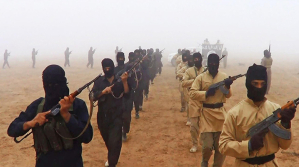
In an attempt to avoid linking the terrorist group ISIS to Islam, U.S. state officials have started using the word "Daesh" instead.
"Our partners, at least the ones that I work with, ask us to use that because they feel that if you use ISIL that you legitimize a self-declared caliphate, and actually they feel pretty strongly that we should not be doing that," said Army Lt. Gen. James L. Terry, commander of Combined Joint Task Force - Operation Inherent Resolve. ISIL is another acronym used for ISIS, which stands for Islamic State of Iraq and the Levant (or Syria).
"Daesh is why we are here," the commander continued. "Daesh uses terror and fear to dominate people and reward themselves. It has demonstrated time and time again a disregard for life and humanity. It has also openly stated intentions to apply its trademark barbaric methods not only regionally, but globally as well."
The clarification was made during a Pentagon briefing on Thursday after a complaint from officials in France back in September. "This is a terrorist group and not a state. I do not recommend using the term Islamic State because it blurs the lines between Islam, Muslims, and Islamists," France's Foreign Minister Laurent Fabius said in a statement. "The Arabs call it 'Daesh' and I will be calling them the 'Daesh cutthroats.'"
According to reports at The Week, "The name Daesh is a 'loose acronym' for 'Islamic State of Iraq and the Levant' (al-Dawla al-Islamiya al-Iraq al-Sham). The name is commonly used by enemies of ISIS, and it also has many negative undertones, as Daesh sounds similar to the Arabic words Daes (one who crushes something underfoot) and Dahes (one who sows discord)." The Associated Press reports that the name Daesh is so hated by Iraqi militant fighters that they've threatened to cut out the tongues of anyone who uses the word.
Lt. Gen. Terry went on to explain during the Pentagon briefing that partner nations in the Middle East have also expressed concern over the use of ISIS and ISIL.
Back in September, President Obama made the claim that ISIS has nothing to do with Islam. "Now let's make two things clear: ISIL is not Islamic," Obama said, speaking from the state floor of the White House residence during his prime-time speech commemorating the 13th anniversary of the September 11 attacks. "No religion condones the killing of innocents, and the vast majority of ISIL's victims have been Muslim."
This sentiment, of course, raised a few concerns among the American people. The Huffington Post's Alastair Crooke addressed the statement in his own opinion piece on the site. "Let us be plain: President Obama's [...] basic premise that America and its allies are fighting a deviant, un-Islamic ideology, which must, and can be delegitimized by gathering together the Sunni Arab world to pronounce it 'un-Islamic,' simply underlines how little they 'know' about ISIS -- with which they are about to go to war.
"There is no 'true Islam' in Islam," Crooke continues. "There has never been any central 'authority' in Islam that could define such a thing. For better or worse (mostly for the better), Islam wears many faces. But paradoxically, there is one contemporary orientation that does make the big claim of being 'true Islam': Wahhabism."
Despite the politically correct intentions of avoiding any connection with Islam as a whole, Rear Admiral John Kirby, the Pentagon press secretary, said on December 12 that this isn't an official policy change. "Here in the Pentagon, we continue to refer to them as ISIL, but you may see... some Defense Department individuals using [Daesh] as well, particularly when they're speaking to audiences in the Middle East," Kirby said. "But there's been no change from our policy here that we refer to them as ISIL."







